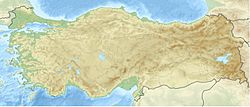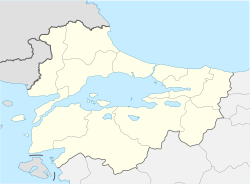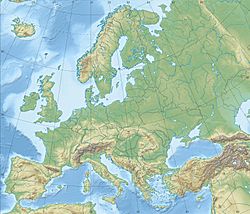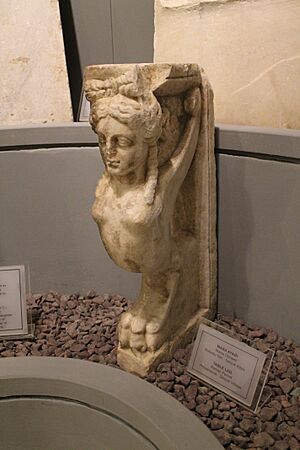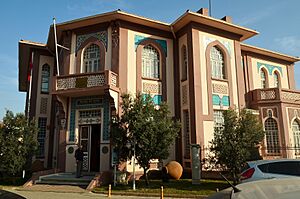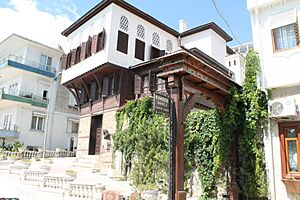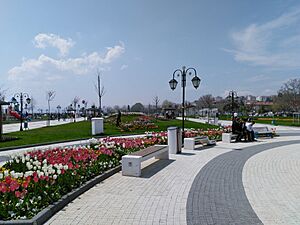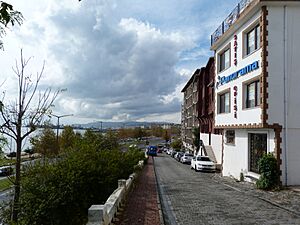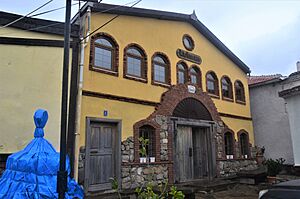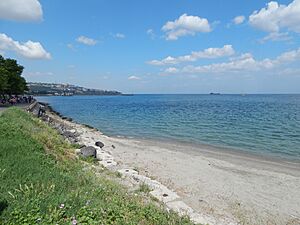Tekirdağ facts for kids
Quick facts for kids
Tekirdağ
|
||
|---|---|---|
|
City
|
||
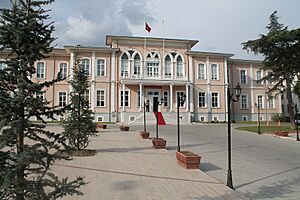 |
||
|
||
| Country | ||
| Province | Tekirdağ | |
| Elevation | 37 m (121 ft) | |
| Population
(2022)
|
||
| • Urban | 186,421 | |
| Time zone | UTC+3 (TRT) | |
| Postal code |
59xxx
|
|
Tekirdağ is a city located in Turkey. It sits on the northern coast of the Sea of Marmara, in a region called East Thrace. The city is the main part of the Süleymanpaşa district. In 2022, about 186,421 people lived there.
Tekirdağ is an important center for trade. It has a busy harbor that handles farm products. This harbor is growing to connect with a new train line for cargo. The city is also home to Martas and the BOTAŞ Terminal, which are both key for trade in the Marmara Region. Tekirdağ is famous for its cherries, and they even have a festival every June to celebrate them!
Because Tekirdağ is close to the borders of Greece and Bulgaria, these countries have special offices there called honorary consulates. During the summer, you can take ferries from Tekirdağ to the nearby Marmara Islands. The closest airport is Tekirdağ Çorlu Airport, but many more flights go to Istanbul Airport.
Contents
Understanding Tekirdağ's Names
Tekirdağ has had many names throughout history. In ancient times, it was known as Bisanthe or Bysanthe. It was also called Rhaedestus. This name was used until the Byzantine era.
After the Ottomans took over in the 14th century, the name changed to Rodosçuk. In Western countries, it was often called Rodosto. After the 18th century, it became Tekfurdağı. This name came from the Turkish word tekfur, which meant "Byzantine lord." Over time, the name changed again to Tekirdağ, which is its official name today under the Turkish Republic.
A Look Back at Tekirdağ's History
The city of Tekirdağ has a very long history, going back to about 4000 BC. The ancient Greek writer Xenophon mentioned it in his book Anabasis. He wrote that it was part of the kingdom of the Thracian king Seuthes. The historian Herodotus also mentioned the city as Bisanthe. It was a colony founded by people from the island of Samos.
In the 6th century AD, the town was rebuilt by Justinian I. The city was attacked and looted by the Bulgarians in 813 and again in 1206, after the Battle of Rodosto. Despite this, it remained an important place during later Byzantine times. From 1204 to 1235, the city was controlled by the Venetians. This happened after the Latin occupation of Constantinople during the Fourth Crusade.
During the Ottoman period, Tekirdağ was part of different provinces. After 1849, it became the main city of the Sanjak of Tekfürtaği.
Tekirdağ in the 1900s
Tekirdağ was taken over by the Russian army twice. First, on August 22, 1829, during the Russo-Turkish War (1828–1829). Then again on February 1, 1878, during the Russo-Turkish War (1877–1878). After these wars, the city returned to Ottoman rule.
In 1905, about 35,000 people lived in Tekirdağ. About half of them were Greeks. The Bulgarian army occupied Tekirdağ on November 11, 1912. The city was freed on July 13, 1913.
Later, the Greek army occupied Tekirdağ on July 20, 1920, during the Turkish War of Independence (1919–1922). After an agreement called the Armistice of Mudanya was signed, the city was given back to Turkey on November 13, 1922. In 1923, an agreement for the Exchange of Greek Orthodox and Muslim Populations meant that all Greek Christians in Tekirdağ had to leave. Muslim Turks from Greece moved into their place.
In December 1934, a group of 1,583 Turkish-speaking Muslims from Dobruja and Ada Kaleh came to live in Tekirdağ. For many years, Tekirdağ was a storage place for products from the Edirne province. However, its trade slowed down when another city, Alexandroupolis, became the end point of the railway line.
Where is Tekirdağ Located?
Tekirdağ is on the northern coast of the Sea of Marmara. It is about 135 kilometers (84 miles) west of Istanbul. The city has a beautiful bay. Behind the bay is a mountain called Tekir Dağı, which is about 2,000 feet high. This mountain gives the city its name. Another mountain, Ganos Dağı, is located between Tekirdağ and Şarköy.
Tekirdağ's Climate and Weather
Tekirdağ has a Mediterranean climate. This means it has hot and humid summers. The winters are cool and wet. It often snows for one or two weeks between December and March.
- Highest recorded temperature: 40.2°C (104.4°F) on June 27, 2007
- Lowest recorded temperature: -13.5°C (7.7°F) on January 3, 1942
| Climate data for Tekirdağ (1991–2020, extremes 1940–2023) | |||||||||||||
|---|---|---|---|---|---|---|---|---|---|---|---|---|---|
| Month | Jan | Feb | Mar | Apr | May | Jun | Jul | Aug | Sep | Oct | Nov | Dec | Year |
| Record high °C (°F) | 23.9 (75.0) |
24.7 (76.5) |
28.1 (82.6) |
34.3 (93.7) |
33.8 (92.8) |
40.2 (104.4) |
38.4 (101.1) |
39.4 (102.9) |
39.7 (103.5) |
35.1 (95.2) |
28.2 (82.8) |
23.5 (74.3) |
40.2 (104.4) |
| Mean daily maximum °C (°F) | 8.6 (47.5) |
9.4 (48.9) |
12.0 (53.6) |
16.1 (61.0) |
21.2 (70.2) |
26.0 (78.8) |
28.7 (83.7) |
29.1 (84.4) |
25.1 (77.2) |
20.0 (68.0) |
15.1 (59.2) |
10.4 (50.7) |
18.5 (65.3) |
| Daily mean °C (°F) | 5.2 (41.4) |
5.8 (42.4) |
8.1 (46.6) |
12.0 (53.6) |
17.1 (62.8) |
21.8 (71.2) |
24.4 (75.9) |
24.8 (76.6) |
20.7 (69.3) |
16.1 (61.0) |
11.4 (52.5) |
7.1 (44.8) |
14.5 (58.1) |
| Mean daily minimum °C (°F) | 2.4 (36.3) |
2.8 (37.0) |
4.8 (40.6) |
8.4 (47.1) |
13.1 (55.6) |
17.4 (63.3) |
19.8 (67.6) |
20.5 (68.9) |
16.7 (62.1) |
12.7 (54.9) |
8.2 (46.8) |
4.2 (39.6) |
10.9 (51.6) |
| Record low °C (°F) | −13.5 (7.7) |
−13.3 (8.1) |
−10.4 (13.3) |
−1.2 (29.8) |
2.7 (36.9) |
8.6 (47.5) |
10.9 (51.6) |
11.0 (51.8) |
3.7 (38.7) |
−1.8 (28.8) |
−7.8 (18.0) |
−10.9 (12.4) |
−13.5 (7.7) |
| Average precipitation mm (inches) | 58.2 (2.29) |
62.7 (2.47) |
53.7 (2.11) |
40.8 (1.61) |
37.8 (1.49) |
37.9 (1.49) |
28.5 (1.12) |
16.4 (0.65) |
45.7 (1.80) |
81.6 (3.21) |
61.2 (2.41) |
76.6 (3.02) |
601.1 (23.67) |
| Average precipitation days | 10.03 | 9.9 | 10.47 | 9.33 | 8.37 | 7.13 | 3.43 | 2.4 | 5.27 | 8.03 | 8.37 | 11.1 | 93.8 |
| Average snowy days | 3.96 | 3.46 | 1.42 | 0 | 0 | 0 | 0 | 0 | 0 | 0 | 0.25 | 2.71 | 11.8 |
| Mean monthly sunshine hours | 83.7 | 98.9 | 136.4 | 180.0 | 232.5 | 264.0 | 297.6 | 269.7 | 207.0 | 142.6 | 99.0 | 77.5 | 2,088.9 |
| Mean daily sunshine hours | 2.7 | 3.5 | 4.4 | 6.0 | 7.5 | 8.8 | 9.6 | 8.7 | 6.9 | 4.6 | 3.3 | 2.5 | 5.7 |
| Source 1: Turkish State Meteorological Service | |||||||||||||
| Source 2: Meteomanz (snowy days 2000-2023) | |||||||||||||
Tekirdağ Today: What's it Like?
Many people have holiday homes in the Tekirdağ area. This is because the city is only a two-hour drive from Istanbul on a new four-lane highway. The villages of Şarköy, Mürefte, and Kumbağ are very popular with Turkish tourists. While the Marmara Sea has some pollution, there are still public beaches near Tekirdağ, especially the Yeniçiftlik beaches.
Many old Ottoman wooden buildings have been replaced by modern concrete apartment blocks. However, some are being fixed up or rebuilt to look like the old ones. The city is known for a local dish called Tekirdağ köftesi. These are small, spicy, grilled meatballs. People often eat them with a sweet local cheese and a dessert made from semolina pudding.
The areas inland from Tekirdağ city have rich farmland. Farmers grow winter wheat, sunflowers, cherries, and grapes for making wine. The main highway that goes east-west (which was the ancient Roman Via Egnatia) and the highway north to Muratlı and Lüleburgaz both have four lanes.
On the eastern side of the city is the Namık Kemal University. It was founded in 2006 and has three different schools.
Tekirdağ's Famous Local Product
This part of Turkey is well-known for its high-quality local product called rakı. The places that make this product were owned by the government until the 1990s. Now, they are privately owned. The industries that make wine and rakı are growing again, even though there are high taxes on these products.
Places to Visit in Tekirdağ
In Tekirdağ City
- The Rüstem Paşa Mosque was built in 1553 by the famous Ottoman architect, Mimar Sinan.
- The Tekirdağ Museum of Archaeology and Ethnography shows ancient items found in the area. It also has items that show how people used to live in the region.
- The Namık Kemal House Museum is dedicated to the life and works of the Turkish poet Namık Kemal (1840–1888).
- The Rakoczi Museum is an 18th-century Turkish house. The Hungarian national hero, Francis II Rákóczi, lived here from 1720 until he died in 1735. Today, the country of Hungary owns this museum.
- Of all the many statues of Atatürk in Turkey, the one in Tekirdağ city center is special. It is the only one that was made exactly life-size.
Around Tekirdağ Province
- The Kutman Wine Museum is located in Mürefte, which is in the Şarköy area.
Famous People from Tekirdağ
- Phaedimus of Bisanthe (3rd or 2nd century BC), an ancient Greek poet.
- Francis II Rákóczi (1676–1735), a Hungarian prince and national hero.
- Bekri Mustafa Pasha (1688–1698), an important Ottoman official.
- Kelemen Mikes (1690–1761), a Hungarian political figure and writer.
- Cezayirli Gazi Hasan Pasha (1713–90), an Ottoman admiral.
- Namık Kemal (1840–1888), a nationalist poet.
- Memduh Şevket Esendal (1883–1952), a writer.
- Tekirdağlı Hüseyin Pehlivan, a wrestling champion (1908–82).
- Solomon Maimon (Rabbi) (1918–2019), an American Sephardic Rabbi.
- Henri Verneuil (1920–2002), a playwright and filmmaker.
- Nefise Akçelik (1955–2003), a civil engineer who built tunnels.
- Erhan Tabakoglu (born 1967), a professor and rector of Trakya University.
- Rifat Karlova (born 1980), a comedian and actor who lives in Taiwan.
- Emre Tetikel (born 1985), an actor and novelist.
Sister Cities of Tekirdağ
Tekirdağ is twinned with these cities:
Other Things Named Tekirdağ
- Tekirdağ Province, which is the larger area that includes the city of Tekirdağ.
- TC-JGE, a Turkish Airlines Boeing 737-800 plane that crashed as Flight 1951 on February 25, 2009.
- TC-JMJ, a Turkish Airlines Airbus A321 plane.
Images for kids
See also
 In Spanish: Tekirdağ para niños
In Spanish: Tekirdağ para niños
 | Toni Morrison |
 | Barack Obama |
 | Martin Luther King Jr. |
 | Ralph Bunche |



